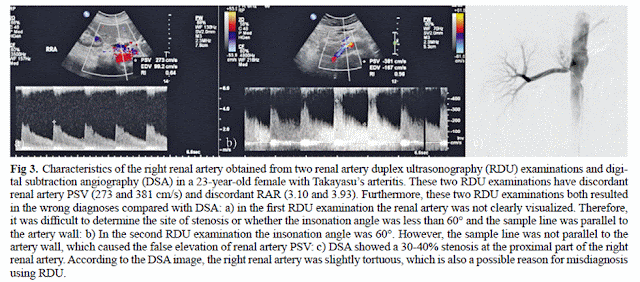Abstract
Aim: Renal artery duplex
ultrasonography (RDU) is an effective and non-invasive screening test in
diagnosing renal artery stenosis. The discordance of results in multiple
RDU is common. We aim to evaluate the discordance and the reasons for discordance
between diagnoses and measurements from multiple RDU examinations.
Material and method: A
retrospective study was performed in 64 examinations of renal arteries
from 32 patients that were referred for two or more RDU examinations and
renal artery digital subtraction angiography (DSA) within six months, between
August 2013 and January 2016. Using DSA as gold standard, we divided the
renal arteries into three groups: discordant (one diagnosis of RDU was correct
and one was wrong), misdiagnosed (neither RDU diagnosis was correct) and
correct (both RDU diagnoses were correct) groups.
We evaluated the discordance and reasons for discordance of diagnoses and measurements from multiple RDU examinations.
We evaluated the discordance and reasons for discordance of diagnoses and measurements from multiple RDU examinations.
Results: Among 64 renal
arteries included in this study, 37 renal arteries had two correct diagnoses,
19 renal arteries had two discordant diagnoses, and eight renal arteries
were misdiagnosed twice by RDU. The discordance of peak systolic
velocity (PSV), the ratio between PSV in the renal artery with stenosis
and PSV in the aorta (RAR), and tardus-parvus waveform measurements were
clearly higher in the discordant diagnoses group than in the correctly
diagnosed group. The most common reason for a discordant diagnosis was
failure in obtaining correct tardus-parvus waveforms of the interlobar artery
(26.31%). The
most common reason for misdiagnosis was the presence of an extremely severe stenosis with an atrophic kidney (31.25%). Overall, 87.50% of patients underwent RDU examinations had correct diagnoses of stenosis or occlusion at least once (including location and degree), as confirmed by DSA.
most common reason for misdiagnosis was the presence of an extremely severe stenosis with an atrophic kidney (31.25%). Overall, 87.50% of patients underwent RDU examinations had correct diagnoses of stenosis or occlusion at least once (including location and degree), as confirmed by DSA.
Conclusions: Our study
indicates that standard operating procedures and improvements in
examination technique by ultrasound doctors could reduce the discordance
between multiple tests.




Không có nhận xét nào :
Đăng nhận xét